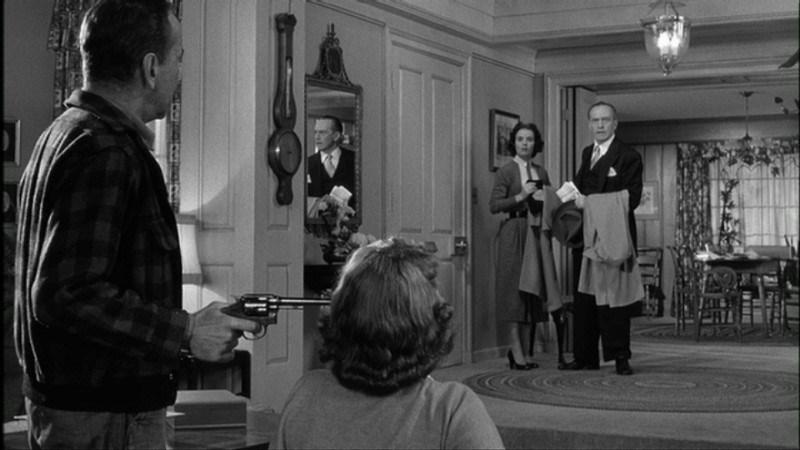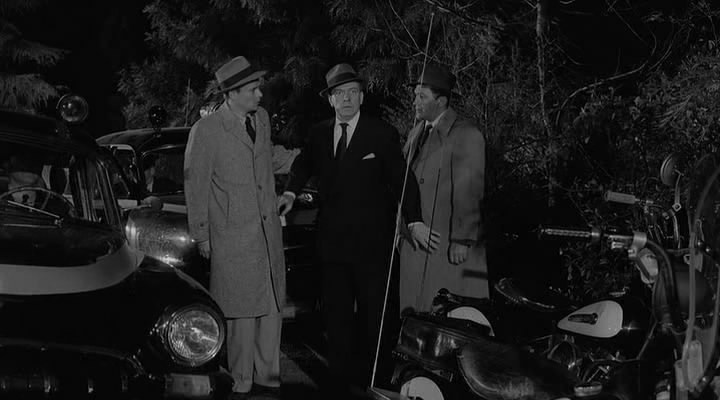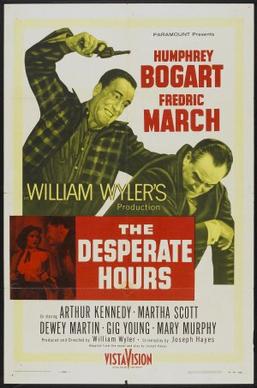'Bout Damn Time - William Wyler's THE DESPERATE HOURS
While The Desperate Hours is written by Joseph Hayes from both a play AND a novel that he also wrote, it's hard not to see the film and not think, if one has also seen it, the 1936 film The Petrified Forest. Twenty years apart in release, both films feature Humphrey Bogart as a no-nonsense-I'll-kick-your-fucking-teeth-in gangster who is on the run - previously he was Duke Mantee, a bank robber, young and full of vigor - and this time just got out of prison. Both films has the man held up in one location, putting the people he's with at gun-point to do what he says or he'll plug em' full of holes, and all while waiting for a girl to come to pick him up. Always with the dames.
 |
| Just another house.... or is it? Actually, yeah it is, but the family... |
For me it was fascinating to have that Archie Mayo film in mind while seeing this, and how much Bogart, while obviously older, without any less of the fear or terror he could put into people, only this time maturer and with his Glen Griffin with a couple other goons (one of which, the big galut Hal played by Dewey Martin, is his brother), holds up a family in a suburban Indiana town. And more than that, Bogart, for what it's worth for him being the Goddamn Bogart, has a worthy adversary on screen with Frederic March playing a father of two and a husband who won't stand still for Griffin's taunts at the family and threats... until he has no choice really, and shows his fear.
 |
| "Hey, Captain Obvious, we get it!" |
It should be a pretty fool-proof scheme for Griffin and his crew, to hang out at a very clean cut 1956 suburban home while the damn from Pittsburgh drives over to get them out of police lines, but it's not so easy when little occurrences come up: the daughter's boyfriend who has to be kept out of the loop, and to the point where he wonders what's gotten into the girl he loves; the little boy, Ralphie (played by an unusually great child actor, natural and incorrigible, Richard Eyer), who is the toughest of the whole family and doesn't get (till a gun is pointed at him) the severity of the situation; a delivery man in the morning who wonders why Mrs. Hilliard looks so pale, and then is even more surprised when Hal hijacks his truck as they drive away.
 |
| Don't make me break out the loogie, kid! |
It's a tense kidnapping situation that is led by a character like Griffin (and through Bogart's usual composure his performance) with a mix of gruff brutishness and a kind of honor-code that he'll keep his word, and the script by Hayes turns the 1950's a little on its head. A film like The Desperate Hours, like Nicholas Ray's also 1956 film Bigger Than Life, takes the "Common Suburban Family", the kind that sits at the table and minds there manners and where the wife makes the table and stays at home while the father reads the paper and Knows Best for junior, and strips the veneer just enough to see the raw and potential underneath. What happens when the Average American Family becomes vulnerable? To be sure this is an extreme example of being held hostage in one's home while criminals await a pick-up so as to get away from prison, but it does the job well to see the nerve endings of the Hilliard family in this situation - what humanity is left underneath.
There's some standard scenes in there too, like the police detective on the case doggedly trying to pursue the leads, make sure to track all calls going from this town to Pittsburgh and don't stop her just tail her oh no she's been put away for the night for speeding, and how this case goes through those motions with some tension in the department. And there's some genuine suspense at what Mr. Hilliard (a very tense but pitch-perfect performance from March) will do next, such as when he's in his office and could alert someone, but how, and what way(?) But it really comes down, at least in my opinion, to this struggle between the family and the criminals, and what Mr. Hilliard will actually *do* about this situation, and what fear really means when confronted with it.
 |
| This looks like a job for Superman.... maybe. |
By the last ten minutes it becomes a down-to-the-second kind of scenario, and when the tables finally turn between Bogart and March it's hard to see it coming down any other way. But what I liked near the end, what I didn't expect from Wyler, was just for a split moment giving (via Bogart being so cool when he can be) just a hint of sympathy when the gun is finally on him. It's not spoken, and I may have read it wrong since Griffin is such a mean bad-ass character. But is there anything else for him but doom in this scenario? Maybe not. And maybe The Desperate Hours works so well that way, as a solid, unpretentious thriller of its period that makes things so tightly wound. Certainly its one of Bogart's late-period highlights, and a classic (if not perfect due to a few unnecessary scenes with the kids and some fretting from the wife) that should be seen by any film enthusiast of the period of American film.
(PS: Apparently the role was originated on stage by Paul Newman that Bogart plays, and some at the time thought he was miscast due to age. If it'd been meant to be played young, yes, but boy were they wrong!(



Comments
Post a Comment